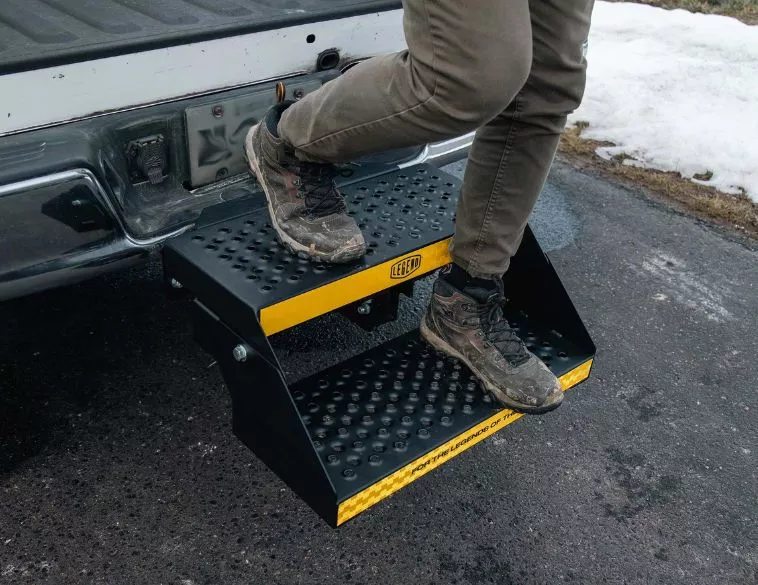All-Season vs. All-Weather vs. Winter Tires

When are all-weather tires the best option for your fleet?
Choosing the right type of tires for your fleet used to be pretty straightforward. In some parts of Canada, all-season tires were the best option, while in other parts, all-season tires were fine for the warmer months, but winter tires were a must when temperatures dropped.
A few years ago, however, a new category of tires came to market, offering fleets a third option. Known as “all-weather” tires, they offer the best of both worlds. They work well in the warmer months, and since they have a 3-Peak-Mountain-Snowflake (3PMS) logo on the sidewall, they’re perfectly fine in winter weather too.
All-weather tires are what all-season tires promised to be—tires you can actually use all year. Essentially, they’re all-season tires with the added benefit of 3PMS certification.
“All-weather tires have the 3PMS logo on them, so they offer way better traction in the winter than regular all-season tires,” explains Ugo Desgreniers, Director of Product Strategy for Stox Distribution.
So at first glance, all-weather tires sound like the best possible option. After all, why would you invest in two sets of tires for all your fleet vehicles, when you can get away with just one set that stays on all year round? The answer is simple: compromise.
The all-weather compromise
Since they’re designed to handle temperature extremes, as well as everything from dry pavement to icy roads and snow, all-weather tires are a compromise. They’re not as good in the summer as a dedicated summer tire, and they’re not as good on snow and ice as a dedicated winter tire.
“All-weather products are fantastic, but they are not a replacement for dedicated winter products,” says Ian McKinney, Senior Product Manager at Bridgestone. “So if you're going to be dealing with extended winter conditions, or heavy snow, and especially ice, winter products are still the gold standard.”
Even so, for many fleets all-weather tires are a compromise they’re willing to make. Not having to buy two sets of tires, or swap out tires twice a year, nor pay for storage is a plus for some fleet managers.
Growing in popularity
Stox Distribution’s Desgreniers says he’s seeing a big uptick in the popularity of all-weather tires. “All-weather tires are very popular in all the provinces, except Quebec,” he says. “People used to buy regular all-season tires in the past, but now they have all-weather tires as an option, and they’re available from most brands. The all-weather segment is growing really fast right now.”
As for Quebec drivers, Desgreniers explains that they don’t want to compromise when it comes to winter safety. “All drivers in Quebec have already used winter tires, mainly due to the mandatory law requiring them during the winter season,” he adds. “These same drivers continue to prioritize purchasing true winter tires to ensure the best possible safety in winter conditions—as opposed to all-weather tires, which offer lower performance in harsh winter conditions.”
That’s a fair point that fleet professionals need to keep in mind when looking at options for the vehicles they manage. In parts of Canada where winters are mild, all-weather tires may be an acceptable compromise. However, in Quebec, or in the northern parts of any of the provinces where ice and snow are a major concern, the added traction of dedicated winter tires is a big plus.
Greater availability
When all-weather tires debuted on the market years ago, they were available in limited sizes and they offered limited performance. Desgreniers says much has changed, and all-weather tires are now available for pretty much all vehicles on the road today. Moreover, they come in a range of prices, which is key for fleet managers working with a budget.
The good news, Desgreniers says, is that you don’t have to spend a lot to get a decent all-weather tire. However, some lower-priced options can be more noisy and they can wear out a bit faster. “But if you buy premium all-weather tires, you’ll get the same mileage that you would from an all-season tire,” he adds, “but with better traction on snow and ice.”
Do the math
For some fleet managers, the choice between a single set of all-weather tires vs. a set of dedicated winter tires, plus a set of all-season tires for the warmer months, will come down to a math question.
Each fleet manager has to ask themselves: Is it more economical to invest in all-weather tires that we’ll have to replace in two or three years (depending on the distances your vehicles travel per year), or does it make more sense to buy a set of winter tires that we use half the year, plus a set of all-season tires that we use the other half, and we won’t have to replace them at all because we’re planning to remarket these vehicles in the next four or five years?
So, in the end, although all-weather tires are a great option, there’s much to consider before jumping on the all-weather bandwagon. Keep in mind that this new breed of tires is a compromise. While they may be perfectly adequate during the warmer months, if your fleet has to tackle serious winter conditions during the colder months, then you’re still safer with a set of dedicated winter tires.
As James McIntyre, SVP Sales Canada / Product Development North America at Sailun Tire Americas explains, “All-weather tires are doing well in urban markets where space is difficult to find to store an extra set of tires, and where either the weather is not bad, or the commute is short,” he says. “Anyone who has commuted any distance on the 400-series of highways in Ontario knows they would rather have a dedicated winter tire.”





